Intuition
Notes
Intuition can be conceived as the trained, refined version of Instincts. It usually means that we have managed to convert our explicit conscious expertise into subconscious automatic response. Habit formation Effort Storing. downtime brain Some forms of experience knowledge can be perceived as a type of intuition, like riding a bike, it's a complicated process that we do intuitively without thinking.
This has several advantages and disadvantages. Advantages:
- High efficiency - We have to think less to produce the same quality output as a novice. We think faster, better and use more information to make our decision, while spending very little effort if not any.
Disadvantages:
- Hard to teach - It's very difficult to be a good Mentor when most of our knowledge is in the form of intuition. Since we have automated the process, we lack the Self-awareness necessary to know why we did what we did and how. We are ignorant of our own expertise and how we got there, so we are of little assistance to others.
- Hard to improve - Similarly, once we have automated something, it is very difficult to rethink it and see how we could do it better. Perhaps once something as been automated, there's no going back. That's why they often say that it's easier to teach a novice than an expert, because a novice has no history of bad habits that we need to erase Beginner's Mind
- Prone to biases - Since we are not aware of our thinking process, we are much more prone to biases without much to do about it. Our Judgment might lead us astray without having the capability of analyzing why and how to avoid it.
One way of testing whether our intuition is based on expertise or whether it is full of holes is to test it
Overview
🔼Topic:: behavioral psychology (Map) ◀Origin:: 🔗Link::
Visual
